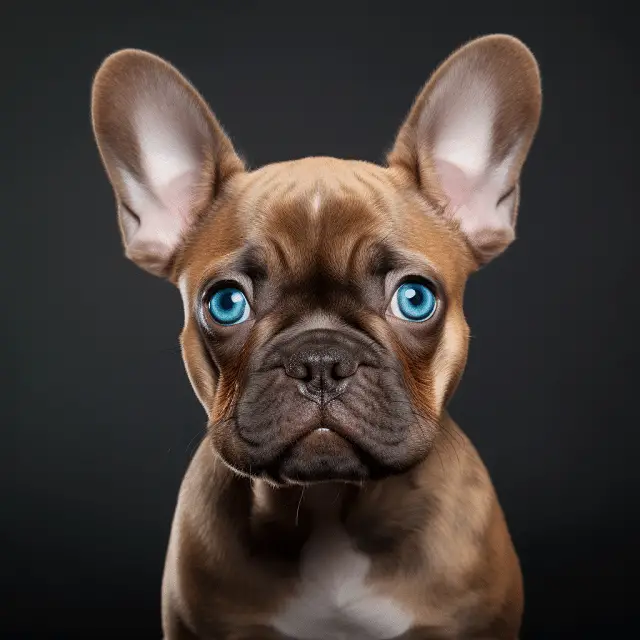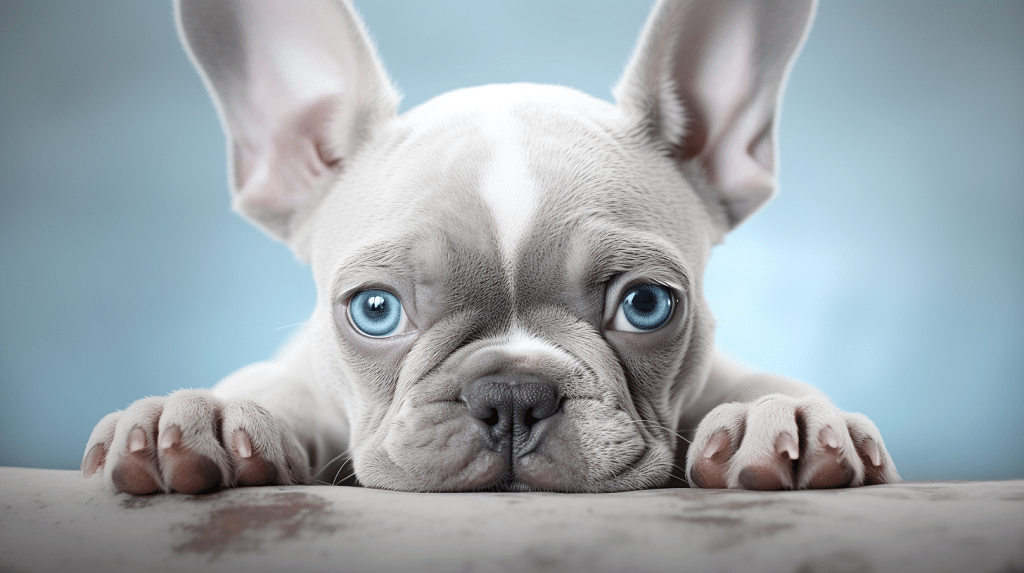With their compact bodies, friendly demeanors, and charmingly bat-like ears, French Bulldogs have truly earned their place in the hearts of dog lovers. However, there’s one attribute that is particularly captivating and rare. So, can French Bulldogs have blue eyes? The answer is yes, French Bulldogs can indeed have blue eyes, but it’s a rarity that makes such individuals truly unique.
Why Do Some French Bulldogs Have Blue Eyes?
Could it be that the S-locus and M-locus genes are the secret behind those beguiling blue eyes in some French Bulldogs? The answer to this question is a resounding yes. These genes indeed play a pivotal role in determining the eye color of these adorable canines.
The S-locus gene, also known as the “white spotting” gene, is responsible for the distribution of white and colored patches on a dog’s coat. However, its influence extends beyond just the coat. It also impacts the pigmentation in a dog’s eyes and skin. When the S-locus gene is dominant, it can lead to lighter eye colors, including blue.
On the other hand, the M-locus gene, often referred to as the “merle” gene, is another key player in this genetic puzzle. When this gene is present, it dilutes the dark pigments in a dog’s coat, leading to a mottled or speckled appearance. This dilution can also affect the pigmentation in the eyes, resulting in blue or partially blue eyes.
However, it’s important to note that the occurrence of blue eyes in French Bulldogs is not merely a result of these two genes acting independently. It’s the interplay between these genes, along with several others, that leads to this captivating phenomenon. The genetic makeup of dogs is a complex tapestry woven from numerous threads, and the blue eyes in some French Bulldogs are just one intriguing pattern in this grand design.
While the blue eyes in French Bulldogs are indeed a charming trait, they can sometimes be associated with certain health issues. For instance, dogs with the merle gene can be more prone to deafness and vision problems. Therefore, it’s crucial for potential owners and breeders to be aware of these potential health implications.

The Unique Appeal and Market Value of Blue-Eyed French Bulldogs
A blue-eyed Frenchie is a magical sight. People are willing to pay a premium for that touch of magic.” This statement encapsulates the allure and market value of blue-eyed French Bulldogs. Their unique charm and rarity have made them highly sought after in the canine world, often leading to a significant increase in their market value.
The appeal of blue-eyed French Bulldogs is multifaceted. First and foremost, their striking blue eyes set them apart from the crowd. This unique feature, contrasting with their typically dark coat, creates an enchanting aesthetic that is hard to resist. Their eyes are often described as “windows to the soul,” and in the case of blue-eyed French Bulldogs, these windows are captivatingly beautiful.
In addition to their physical allure, the personality traits of French Bulldogs further enhance their appeal. Known for their friendly and affectionate nature, these dogs are excellent companions. Their playful demeanor and love for human interaction make them a favorite among families and individuals alike. The blue-eyed variants, with their added visual charm, are often seen as the ‘jewels’ of this already beloved breed.
The rarity of blue-eyed French Bulldogs also contributes to their high market value. The genetic factors leading to blue eyes are not common, making these dogs a rarity. This scarcity, combined with their unique appeal, often results in these dogs being priced higher than their brown-eyed counterparts.
However, it’s important to note that while the allure of owning a blue-eyed French Bulldog can be strong, potential owners should prioritize health and temperament over physical appearance. As mentioned earlier, the genes responsible for blue eyes can sometimes be associated with health issues. Therefore, it’s crucial to work with reputable breeders who prioritize the health and well-being of their dogs over aesthetic traits.
Health Risks and Veterinary Concerns: What You Need to Know About Blue-Eyed French Bulldogs
The Merle gene, while contributing to the unique and enchanting blue eyes, can also bring with it certain health risks. This gene is known to cause a dilution of pigmentation, which can affect not only the coat and eye color but also the internal structures of the ear and eye. As a result, dogs with the Merle gene, like Max, can be more prone to health issues such as deafness and vision problems.
Deafness in dogs can be challenging to detect, especially in puppies. Signs may include a lack of response to noise, difficulty waking up, or excessive barking. If you suspect your dog may be experiencing hearing loss, it’s important to consult with a veterinarian. They can perform specific tests, such as the Brainstem Auditory Evoked Response (BAER) test, to confirm any hearing impairment.
Vision problems are another concern for dogs with the Merle gene. These can range from minor issues, such as increased sensitivity to light, to more serious conditions like cataracts or even blindness. Regular check-ups with a veterinarian can help detect any vision problems early and provide appropriate treatment.
In addition to these, French Bulldogs, in general, are prone to certain breed-specific health issues. These include brachycephalic syndrome due to their short noses, hip dysplasia, and certain skin conditions. Owners of French Bulldogs, regardless of eye color, should be aware of these potential health concerns.

Genetic Testing for French Bulldogs: A Crucial Tool for Health and Breeding
In the world of canine health and breeding, genetic testing has emerged as a powerful tool. It allows breeders, veterinarians, and owners to gain a deeper understanding of a dog’s genetic makeup, providing valuable insights into potential health risks and breed-specific traits. For French Bulldogs, particularly those with the rare blue eyes, genetic testing can be especially beneficial.
Genetic testing can help identify the presence of specific genes, such as the Merle or S-locus genes, which are known to influence eye color in French Bulldogs. These genes, while contributing to the breed’s unique and captivating appearance, can also be associated with certain health implications. For instance, the Merle gene has been linked to increased susceptibility to deafness and vision problems.
By identifying the presence of these genes, genetic testing can provide potential breeders and owners with crucial information. This can guide decisions about breeding, help prepare for potential health issues, and inform appropriate care strategies. For example, if a French Bulldog is found to carry the Merle gene, owners can be proactive about scheduling regular hearing and vision check-ups.
Genetic testing for dogs is typically conducted using a simple cheek swab or blood sample, which is then sent to a laboratory for analysis. The process is non-invasive and painless for the dog. Results are usually available within a few weeks and should be discussed with a veterinarian to fully understand the implications.
For potential breeders, genetic testing is particularly important. It can help ensure that breeding pairs are genetically compatible and that they are not likely to produce puppies with an increased risk of health problems. This is a crucial part of responsible breeding practices and can help maintain the overall health and wellbeing of the French Bulldog breed.
From Puppy to Adult: Understanding Eye Color Changes in French Bulldogs
As French Bulldogs transition from puppyhood to adulthood, their eye color often changes, usually around the age of 10 to 16 weeks. It’s a beautiful process, like watching a time-lapse video, as those shimmering blue eyes slowly darken to a hue of captivating amber or rich brown. This transformation is a natural part of their growth and development, and it’s a fascinating aspect of their journey from puppy to adult.
The change in eye color is due to the maturation of melanin, the pigment that also determines the color of a dog’s coat and skin. In the early weeks of a puppy’s life, the eyes are blue because they lack melanin. As the puppy grows and melanin production increases, the eyes gradually darken. By the time a French Bulldog reaches adulthood, their eyes will have settled into their permanent color, which is typically a shade of brown.
However, in some cases, a French Bulldog’s eyes may remain blue into adulthood. This is usually the result of genetic factors, specifically the presence of the Merle or S-locus genes, as discussed earlier. While this can result in a striking and unique appearance, it’s important to remember the potential health implications associated with these genes.
| Age | Eye Color |
| Birth to 2 weeks | No pigment, eyes closed |
| 2 to 3 weeks | Eyes open, blue or grayish |
| 10 to 16 weeks | Color change occurs, can darken to amber or brown |
| After 16 weeks | Final eye color, usually brown or amber |

Conclusion
In conclusion, the journey of a French Bulldog’s eye color from the shimmering blue of puppyhood to the rich brown of adulthood is a captivating process. However, when it comes to blue-eyed French Bulldogs, potential owners must be aware of the genetic implications and potential health risks. These enchanting dogs deserve informed and compassionate care. Their health and well-being should always be prioritized, regardless of the color of their eyes. Remember, a dog’s value is not in its physical appearance but in its companionship, loyalty, and the unconditional love it offers.
FAQ
1. Are blue-eyed French Bulldogs more expensive?
Yes, typically, blue-eyed French Bulldogs can be more expensive due to their rarity. However, prices can vary greatly depending on the breeder and the specific lineage of the dog.
2. Will my blue-eyed French Bulldog puppy keep its blue eyes into adulthood?
Not necessarily. French Bulldogs often experience a change in eye color as they grow. Puppies may be born with blue or grey eyes, but this can darken to amber or brown, typically around 10 to 16 weeks of age.
3. Are there specific health issues associated with blue-eyed French Bulldogs?
Blue-eyed French Bulldogs might be more prone to certain health issues due to the dominant Merle gene, which can be associated with the blue-eyed trait. Potential concerns include hearing and vision problems, among others.
4. Can I breed my blue-eyed French Bulldog to get more blue-eyed puppies?
While it’s genetically possible, it’s essential to understand the potential health risks associated with the genes that can cause blue eyes. Breeding dogs with these genes can increase the chance of puppies having health problems. It’s recommended to consult with a professional breeder or a vet.
5. Are blue-eyed French Bulldogs considered purebred?
Yes, a blue-eyed French Bulldog can still be a purebred. The blue-eyed trait is due to genetics and doesn’t necessarily indicate a mixed breed. However, this trait is rare and is not the breed standard for French Bulldogs, according to kennel clubs like the AKC.


